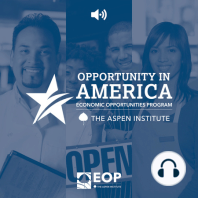78 min listen

The Future of Worker Voice
FromOpportunity in America - Events by the Aspen Institute Economic Opportunities Program
The Future of Worker Voice
FromOpportunity in America - Events by the Aspen Institute Economic Opportunities Program
ratings:
Length:
84 minutes
Released:
Apr 23, 2015
Format:
Podcast episode
Description
Labor unions traditionally have been the voice of workers seeking better pay, benefits, and jobs and have been a critical means for working people to improve their working conditions, incomes, and social standing. The right to form and join a labor union is enshrined in the United Nation’s Universal Declaration of Human Rights. But in the United States, union membership and the commitment to unions is not as strong. Union membership has fallen from a high of 34.8 percent of wage and salary workers in 1954 to 11.1 percent in 2014. Recently, a number of states and the courts have taken actions that weaken labor unions. Indiana, Michigan, and Wisconsin have joined 22 other mostly southern and western states and adopted “right to work” laws that undermine labor union membership. Last year, the US Supreme Court ruled against the home care worker union in the Harris v. Quinn case.
The future of workers’ voice in shaping their jobs today and tomorrow is at a crossroads. Are traditional labor unions able to successfully represent workers today — especially those in fast-growing, low-wage service sector jobs — or have they been too weakened? What are the new models and organizations that have started to emerge over the last two decades? And fundamentally, how can the nation hear from workers themselves and understand their experience of work today if there is no organized voice that brings their perspective to public and private discussions about jobs and work?
A number of both traditional unions and new types of organizations are taking on this challenge of finding new ways to represent the experience of working people in today’s economy. This panel discussion explores issues affecting the future of worker voice and new ways of organizing workers to collectively shape and improve their jobs and careers.
This event features Sarita Gupta (Executive Director, Jobs With Justice), Ruth Milkman (Professor of Sociology and Research Director, CUNY’s Murphy Labor Institute), David Rolf (President, SEIU 775; Founder and Co-Chair, The Workers Lab), Judge Laura Safer Espinoza (Executive Director, Fair Food Standards Council), Cruz Salucio (Watermelon harvester and Spokesperson, Coalition of Immokalee Workers), and moderator Harold Meyerson (Editor-at-Large, The American Prospect; Columnist, The Washington Post)
This event is part of the Working in America series, an ongoing discussion series hosted by the Aspen Institute Economic Opportunities Program that highlights an array of critical issues affecting low- and moderate-income workers in the United States and ideas for improving and expanding economic opportunities for working people. For more information, visit as.pn/workinginamerica.
The Economic Opportunities Program advances strategies, policies, and ideas to help low- and moderate-income people thrive in a changing economy. We recognize that race, gender, and place intersect with and intensify the challenge of economic inequality and we address these dynamics by advancing an inclusive vision of economic justice. For over 25 years, EOP has focused on expanding individuals’ opportunities to connect to quality work, start businesses, and build economic stability that provides the freedom to pursue opportunity. Learn more at as.pn/eop.
The future of workers’ voice in shaping their jobs today and tomorrow is at a crossroads. Are traditional labor unions able to successfully represent workers today — especially those in fast-growing, low-wage service sector jobs — or have they been too weakened? What are the new models and organizations that have started to emerge over the last two decades? And fundamentally, how can the nation hear from workers themselves and understand their experience of work today if there is no organized voice that brings their perspective to public and private discussions about jobs and work?
A number of both traditional unions and new types of organizations are taking on this challenge of finding new ways to represent the experience of working people in today’s economy. This panel discussion explores issues affecting the future of worker voice and new ways of organizing workers to collectively shape and improve their jobs and careers.
This event features Sarita Gupta (Executive Director, Jobs With Justice), Ruth Milkman (Professor of Sociology and Research Director, CUNY’s Murphy Labor Institute), David Rolf (President, SEIU 775; Founder and Co-Chair, The Workers Lab), Judge Laura Safer Espinoza (Executive Director, Fair Food Standards Council), Cruz Salucio (Watermelon harvester and Spokesperson, Coalition of Immokalee Workers), and moderator Harold Meyerson (Editor-at-Large, The American Prospect; Columnist, The Washington Post)
This event is part of the Working in America series, an ongoing discussion series hosted by the Aspen Institute Economic Opportunities Program that highlights an array of critical issues affecting low- and moderate-income workers in the United States and ideas for improving and expanding economic opportunities for working people. For more information, visit as.pn/workinginamerica.
The Economic Opportunities Program advances strategies, policies, and ideas to help low- and moderate-income people thrive in a changing economy. We recognize that race, gender, and place intersect with and intensify the challenge of economic inequality and we address these dynamics by advancing an inclusive vision of economic justice. For over 25 years, EOP has focused on expanding individuals’ opportunities to connect to quality work, start businesses, and build economic stability that provides the freedom to pursue opportunity. Learn more at as.pn/eop.
Released:
Apr 23, 2015
Format:
Podcast episode
Titles in the series (100)
Home Economics: A Discussion about the Unregulated World of Domestic Work by Opportunity in America - Events by the Aspen Institute Economic Opportunities Program